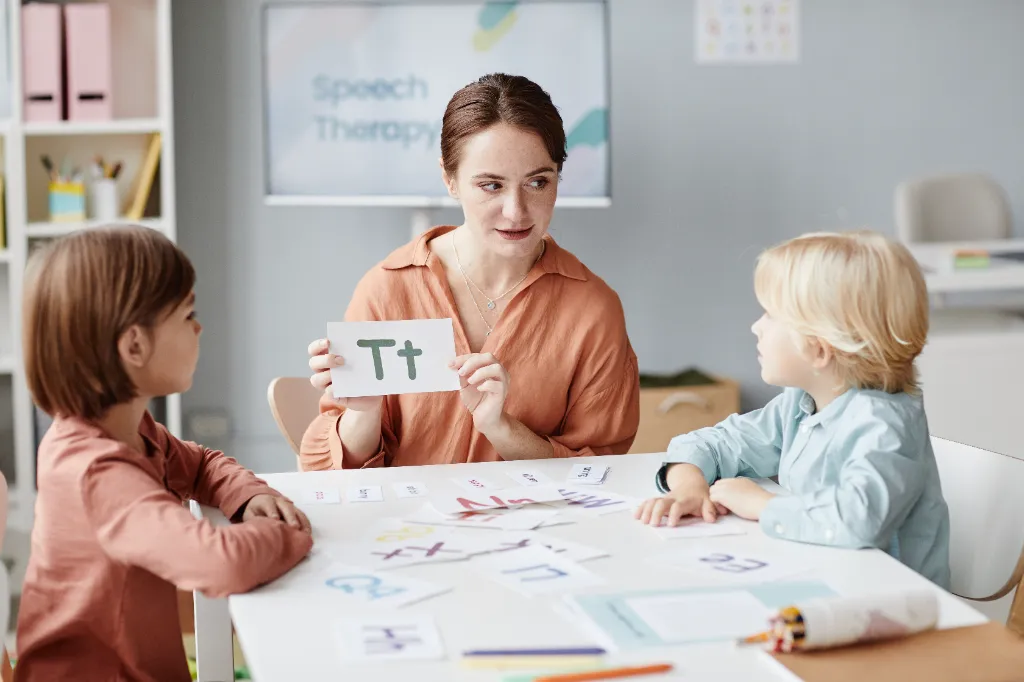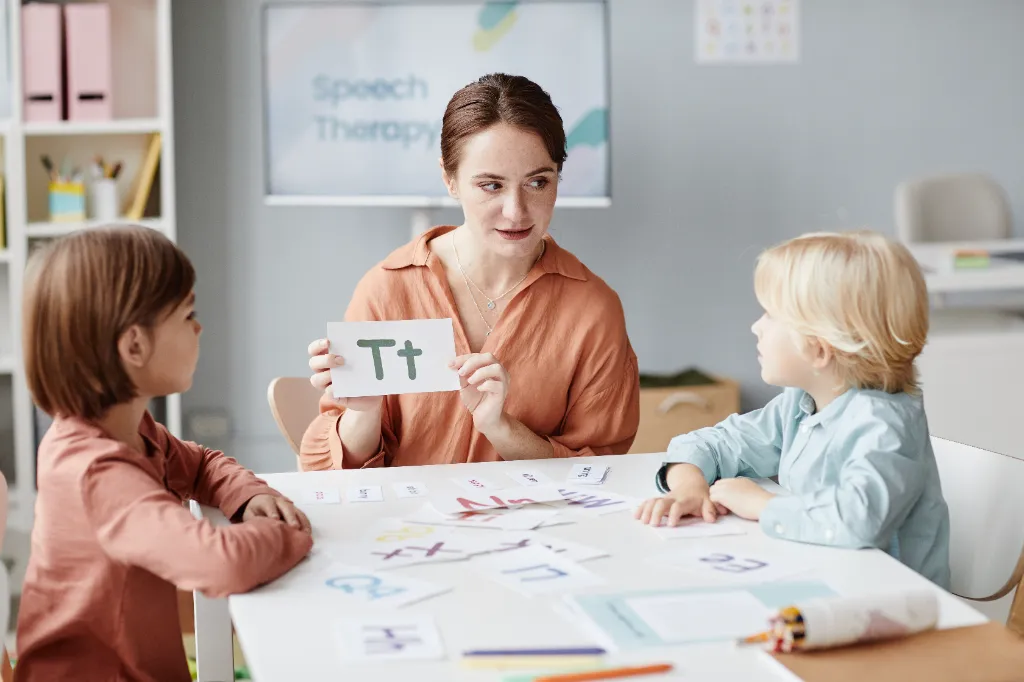What Is Speech and Language Therapy?
Speech and language therapy, often referred to as speech therapy, is a specialised therapeutic approach. It focuses on assessing and supporting people with speech and language difficulties, including challenges with communication and swallowing. Speech and language therapists work with people of all ages who may have difficulties with speech sounds, language development, fluency, and feeding or swallowing.
Speech and language therapy encompasses a wide range of interventions tailored to each person’s specific needs. This may include one-on-one therapy sessions, group therapy, or consultations with family members and caregivers to create a supportive environment. Additionally, speech and language therapists collaborate closely with other healthcare professionals, such as doctors, nurses, and educators, to ensure holistic care.
Through evidence-based practice and continuous professional development, speech and language therapists strive to enhance communication, promote independence, and improve the overall well-being of the people they serve.
What Are Speech Disorders?
Speech disorders encompass a range of difficulties that affect a person’s ability to produce sounds that form words. Speech disorders are distinct from language disorders, which primarily impact the understanding and expression of language.

Common types of speech disorders include stuttering, apraxia, and dysarthria. Stuttering involves interruptions in the flow of speech, while apraxia results in difficulty coordinating the movements necessary for speech. Dysarthria, on the other hand, is characterised by weakness of the muscles used for speech. Speech disorders can manifest in different ways, including repeating sounds, distorting sounds, or experiencing disruptions in the continuity and smoothness of speech production.
It’s important to note that a speech disorder can impact people of all ages, and they may develop over time. Diagnosis of speech disorders often involves comprehensive assessments to identify the specific symptoms and causes, allowing for tailored treatment plans to be implemented.
What Are Language Disorders?
Language disorders encompass a broad spectrum of communication difficulties that affect a person’s ability to understand, use, and express language. They might use short or simple sentences, mix up the order of words, or experience difficulty expressing their thoughts and feelings. It’s important to note that language disorders are distinct from speech disorders, as people with language disorders can produce sounds but encounter challenges in using them to communicate effectively.
Language disorders can manifest in different forms, including expressive language disorder, receptive language disorder, and mixed receptive-expressive language challenges. Expressive language disorder involves difficulty conveying messages through speech, while receptive language disorder pertains to challenges in understanding spoken language. Mixed receptive-expressive language issues encompass struggles with both using and understanding language.
Early intervention is crucial for children with language difficulties. It’s essential for parents and caregivers to be aware of the symptoms and seek evaluation by a speech-language specialist if they observe persistent challenges in their child’s language development.
When Speech-Language Therapy Can Help?
Speech-language therapy can be beneficial for people of all ages who experience challenges related to communication, language, or swallowing, such as:
- Aphasia: Difficulties in reading, writing, speaking, and understanding language.
- Dysarthria: Characterised by slow or slurred speech due to muscle weakness, often caused by challenges such as multiple sclerosis, amyotrophic lateral sclerosis (ALS), or stroke.
- Speech Sound Disorders: Challenges in producing speech sounds, which can impact overall communication.
- Language Disorders: Difficulties with understanding and using language, affecting communication and language development.
- Developmental Language Disorders: Language difficulties that arise during a child’s developmental years, impacting their ability to communicate effectively.
- Apraxia: Difficulty coordinating the movements necessary for speech, impacting the ability to produce sounds and words.
- Brain Injuries: Difficulty with speech and language can stem from brain injuries and may affect a person’s ability to communicate and swallow.
Speech therapists work with people to find exercises and treatments that address their specific needs. Speech and therapy exercises and activities may involve interactive techniques, modelling correct sounds, and providing strategies and homework for continued progress at home.
The Role of a Speech and Language Therapist
The role of a speech and language therapist is multifaceted and encompasses a wide range of responsibilities:
- Allied Health Professionals: Speech and language therapists are allied health professionals who work with parents, carers, teachers, nurses, occupational therapists, and doctors. They provide treatment, support, and care for people who have difficulties with speech, language, and communication.
- Treatment and Care: Speech and language therapists provide effective care and support to people with speech and language difficulties. They take a person-centred approach and aim to improve people’s skills and confidence.
- Work Settings: Speech and language therapists work in various settings, including the NHS, private health providers, schools and colleges, local authorities, and voluntary and charitable organisations. They may also work with people in their homes or communities.

Speech and language therapists actively contribute to raising awareness, promoting early intervention, and advocating for inclusive communication environments. It’s a dynamic profession that not only addresses specific needs but also seeks to create a more accessible society.
Benefits of Speech and Language Therapy
The benefits of speech and language therapy are extensive and can positively impact people of all ages facing communication or language challenges:
- Improvement of Communication and Language Skills: Speech therapy helps children and adults improve their communication and language skills. It can significantly enhance the quality of life for people and help build confidence.
- Treatment for Various Speech and Language Disorders: Speech therapy can address a wide range of speech and language challenges and provide humanised support tailored to people’s unique needs.
- Enhancement of Overall Quality of Life: Speech therapy can assist with relationship building and skill enhancement, helping people become an active part of their communities. It is not limited to children and can benefit people of any age.
- Addressing Feeding and Swallowing Difficulties: Speech therapy can address feeding and swallowing difficulties, providing techniques and activities aimed at improving overall communication.
- Support for Children’s Development: Speech therapy can benefit children’s development by addressing language difficulties, social skills, and non-verbal communication.
Positive Outcomes With SALT
Speech and language therapy can have a transformative impact on people’s lives. As people progress in their communication or language skills, they may experience increased confidence and a more positive self-perception, leading to overall improved well-being.
It can support the development of early language and speech skills in children, laying a strong foundation for future communication abilities. Speech and language therapy can also help people of any age facing difficulties with language, speech or communication skills.
The speech and language therapy team promotes positive outcomes by helping people increase their independence. This may involve developing the ability to express needs and desires, make choices, and engage in daily activities more autonomously.
SALT With Unique Community Services
Unique Community Services is a specialised care provider that has an in-house therapy team, highly skilled in delivering care and support to people in need.
We provide person-centred support that makes a positive impact on people’s lives. Through our Positive Behaviour Support, speech and language therapy and occupational therapy, we are committed to transforming care for the better and making a change within our community.
Contact us today or visit one of our offices in Manchester and Leeds.
